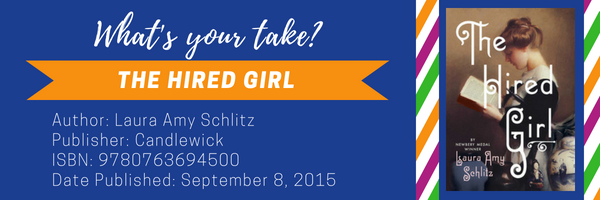Continuing our discussion about books that present situations of pain and bravery as young people learn to negotiate the difficulties of life, Holly and Marilyn consider The Hired Girl by Laura Amy Schlitz. Like Bronze and Sunflower, which we discussed last week, this book offers surprises and a bit of controversy. It is thought-provoking and worthy of our reading time.

HOLLY: This week I have to start by saying, “This book is terrific, Marilyn!” Joan is a spunky 14-year-old who struggles to remember her mother’s memory and kindness as well as her own value beyond the deliberate cruelty of her sexist father and their hardscrabble Pennsylvania farm in 1911. Joan escapes to Baltimore and becomes the hired girl to a Jewish family in Baltimore by changing her name and her age in as a way of meeting the qualifications for working. Her adventures and daily life allows readers and insight into the time period and the working conditions of young women who needed to work and found that work in households across larger cities in the U.S.
Several ideas struck me as I read this book. Dreaming of being a hired girl is something that many of today’s young women might not think of as a way to gain independence, but in reality, it is similar to the current position of nanny, a position in which young women around the world are hired to do. Also Joan’s naiveté and voice! In many ways, her innocence reminds me of the tone of Bronze and Sunflower. Both are narratives of what might be considered “simpler times,” but they are not simple stories–both have extreme hardships that are deceiving because they romanticize both time periods and the conditions of the protagonists. It is Joan’s voice that invites the reader into her world, and her directness is without guile, creating a narrator that readers not only trust, but want to see succeed. And Joan does succeed!
This book is entertaining and educative. The insights into the Jewish religion and traditions are fascinating and because they are told from Joan’s Catholic perspective, makes an interesting story that underlies the importance of tolerance, acceptance and celebration. I so loved reading this book! What did you think of it, Marilyn?
MARILYN: I agree this book is terrific. The storytelling and the characters are vivid and engrossing. I rooted for Joan from the beginning. I read so many books and few make indelible imprints on my memory and heart the way this one does. Schlitz’s talents as a writer and her care over details in the story make this book a page turner. I didn’t want to put it down! The author’s decision to tell the story through Joan’s diary entries is a bonus because the reader can understand what she is feeling and experiencing. We are with her as she strives to claim her worth in the face of her abusive father’s edicts and then understand her need to survive as a hired girl. Parts of the story make me laugh–the incident when she goes on strike because her father won’t let her keep the money from selling the chicken eggs. And then the sorrow of the response she receives from her father. Other parts make me admire her courage and industry in adapting to the work and people in the home where she becomes a hired girl. I agree with you Holly, about Joan’s naiveté and voice. As the reader comes to know Joan through her voice, it is easier to understand why she misinterprets the interactions between herself and the son in the family. Here’s another book that needs a sequel. I want to know more about what happens to the characters.
HOLLY: I wonder if younger readers will appreciate this book the same way we do! It is a historical novel with little action but more character-driven. Yet, even character-driven, the males in the novel seem more flat than the females. Joan’s father has nothing redeeming about him, the brothers (both sets) seem one-dimensional, and in many respects, Joan is pitted against every character but the father-figure in the household where she works. Perhaps that is the way of diaries, where the writer is the hero(ine) and the world presents obstacles to overcome. What do you think about the element of one-dimensionality?
MARILYN: I am not sure if teens would appreciate this book. I imagine that those who enjoy historical fiction might. However, my book group would enjoy it and I will recommend it at our next gathering. As far as the one dimensionality, I disagree that all the characters are presented in as one dimensional. Certainly not the father of the household where Joan comes to work or the housekeeper, Malka, that Joan comes to love despite her crankiness. Neither is the artist son, David, who she falls in love with or the 12-year-old daughter of the family. I enjoyed how those characters are rounded out as Joan gets to know and care about them. The father of the household is delightful in his efforts to promote her education by recommending books to her and allowing her to use the library in their home. Plus, he guides her behind the scenes so as not to interfere with his strict wife. I certainly agree about Joan’s family and their one dimensionality. I am glad you chose this book. I thoroughly enjoyed reading it.
Title: The Hired Girl
Author: Laura Amy Schlitz
Publisher: Candlewick
ISBN: 9780763694500
Date Published: September 8, 2015
This is the second installment of May 2018’s My Take/Your Take. Our first book is Bronze and Sunflower by Cao Wenxuan and illustrated by Meilo So. To follow the whole conversation, check back each Wednesday.
- Themes: Hired Girl, Holly Johnson, Laura Amy Schlitz, Marilyn Carpenter
- Descriptors: Books & Resources, My Take/Your Take
